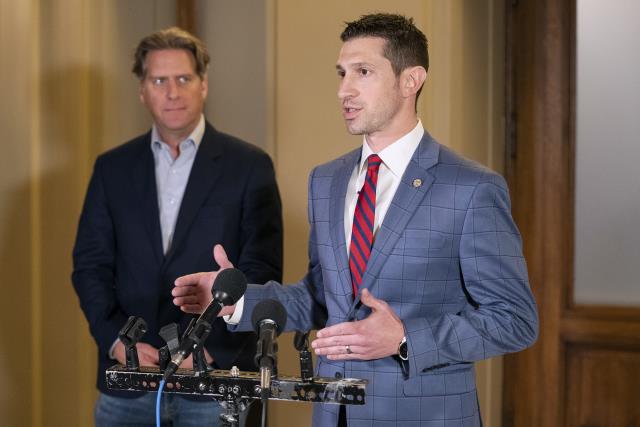Greetings from the Capitol
This week, besides dealing with more sleet and snow, we introduced our proposal to support nursing homes, long-term care facilities, and group homes. We also passed a bipartisan deal to extend the state’s successful Minnesota Premium Security Plan, known as reinsurance.

Supporting Seniors and vulnerable Minnesotans
This week, Senate Republicans introduced a $1.3 billion package that would provide resources to nursing homes, long-term care facilities, and organizations that support individuals with disabilities. This proposal would help address critical short-term and long-term staffing challenges facing personal care assistants, direct support professionals, nursing homes, and assisted living and intermediate care facilities. It also will help ensure these facilities have resources available to provide the staff necessary to care for senior citizens and Minnesotans with disabilities.
As a result of Covid and its after-effects, many of these facilities continue to face stress as staffing shortages have ravaged the industry. For example, there are currently about 23,000 open positions just in Minnesota’s long-term care industry.
To address this, the Senate’s proposal would allocate $1 billion to raise the wages of workers in Minnesota’s long-term care, personal care, and disability waiver rate service industries. This proposal also includes $322 million to recruit more workers in long-term care centers, group homes, and home and direct care providers.
There has been an overwhelmingly large gap in the long-term care workforce, and this funding incentivizes retention and recruitment to fill these spaces. These homes serve our most vulnerable citizens, who deserve high-quality care without interruption. We need to support those working in these facilities, so that residents can continue to have access to the care they deserve.
This crisis is further compounded by the closures of residential providers, therefore driving individuals to other facilities already facing staffing shortages. As a result, individuals are faced with waiting lists and find themselves unable to access essential services. These combined issues are jeopardizing the well-being of those with disabilities, as well as elderly individuals that depend on the services these homes offer.

Reinsurance
Senate recently passed a three-year extension of the successful Minnesota Premium Security Plan, known as “reinsurance” around the Capitol. Reinsurance lowers the cost of the individual market health insurance plans by covering some of the more expensive care costs for people in the individual market. Legislators were facing an April 1 deadline to meet a federal requirement in order to continue the program. Senate Republicans originally passed reinsurance with funding for five years, with no significant policy changes. House Democrats had passed a reinsurance bill with no funding, and significant policy changes.
I’m very proud of the legislators from the House and the Senate, along with the Governors office, that contributed to this process, bringing in their expertise and experience to write this bill. While we had significant differences at the beginning, we worked together to find compromise and deliver for Minnesotans. Passing this as a stand-alone bill is an important improvement to past practices of large supplemental omnibus bills that tie many issues together. Extending reinsurance keeps health care costs low, improves access, and stabilizes the insurance market.
The agreement provides three years of funding for reinsurance at a cost of $890 million. This is the longest extension the legislature has agreed upon and provides the most stability for the market. Record inflation hitting consumers at the grocery store, gas pump, and on services hasn’t hit the health care market yet, but could be seen as Medicare releases its rates for 2023 in the coming months. The Conference Committee also agreed to a few policy changes that require postnatal care coverage and flat fees for prescription drugs that allow the consumer to spread their deductible out over the full plan year.
In 2016 insurance premiums for the individual market increased by double digits, as high as 49%, due to changes from the Affordable Care Act. Additionally, some counties had just one health care insurance plan available to them. In 2017, Republicans in the Senate moved to lower premiums and increase competition among providers by passing Minnesota’s reinsurance program. Following reinsurance implementation, costs stabilized and every county in Minnesota has at least two health care plan options to choose from.
Over time, the reinsurance program has proven to be extremely effective at lowering costs for consumers. Over the first three years after the implementation of the program, premiums decreased by 25.5 percent in Minnesota as compared with an increase of 25.9 percent for the United States overall. The program has led to Minnesota enjoying some of the lowest health insurance rates in the country. Additionally, reinsurance has proven so successful that several other states have created programs since 2017.
Contact me
As always, your feedback is extremely important to me, and I encourage you to share your input on the issues being discussed here at the Capitol. If you have any questions, thoughts, or ideas, please send me an email at sen.jeremy.miller@senate.mn or call my Capitol office at 651-296-5649. It’s a great honor to serve as your State Senator.
Best,
Jeremy R. Miller
Minnesota State Senator
